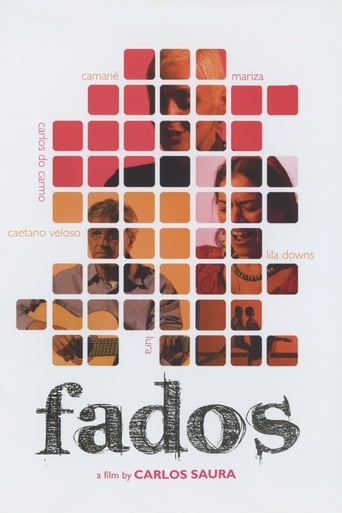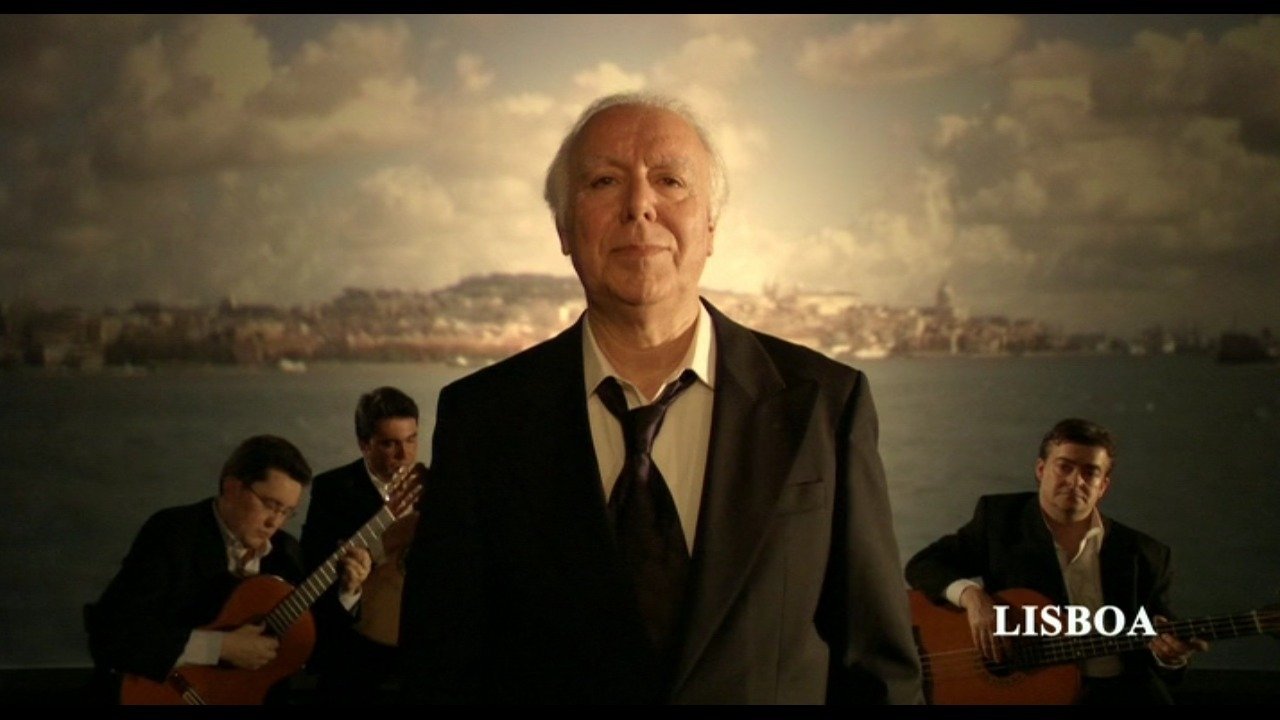mquinn-4
this film is insulting. Fado is amazing music to be savored with a glass of wine or beer in a casa de fado or bar, it is not ballet or modern dance music. Saura had to extend his flamenco ideas (flamenco can be music and dance) to fado which apparently he doesn't understand and underestimates. It is just ridiculous having lovely svelte bodies twirling around with this music, some of which, in fact, is poorly chosen. Sorry, I love Chico and Caetano, but really, in a fado film? Give me a break. I've been to fado joints up and down the length of Portugal and 90 minutes in any single one of those was better than this nearly insufferable travesty. Also, in the version I watched, the song titles were displayed, but not the artists' names. Huh? Too bad he couldn't have thought this through a bit better. Has Saura ever been to Lisbon??????
RResende
I've been dreaming about this film. Despite i've seen this some months ago, i didn't comment on it before because i wanted to understand how it would fit in my imagination. And it has been moving my dreams in ways i had never experienced before. This is a milestone work, and i am marking it as a film one should necessarily watch in order to get maximum range of what moving images can give you.I had experienced the musical genre according to Saura's vision. This one tops what he had done previously with Iberia and Flamenco. He topped everything he had done before in this area. The thing with this is: i'm not sure i watched cinema here. I watched a composition, which concerns music, plastic development of sets based on the feeling they cause, framing, camera movement and so on. So, Saura plays with the whole deck of cards. He plays with camera, sound and image/composition. He uses all the possibilities, and oh, he knows so well where he wants to go.Probably, as a Portuguese i connect with this more specially. Fado is an work in progress, it is a form of expression that jumped out of the "neighbourhood". Amália Rodrigues tried to cross barriers, she looked for making Fado something more jazzy in the way it could play with more notes, breaking forms, and even breaking the idea of rigid forms. Ary dos Santos was her equivalent in what concerns lyrics (and he supported in this quest the upcoming Carlos do Carmo, who performs here). But when Amália started, she had fascism supporting "traditional" and fado had necessarily to play the cultural role of supporting the soul of the people, and the health of the empire. So she could never take the music to a whole new level, as it is being done in recent years.Mariza shows now, well supported by the right people, and she took musically fado to a new artistic level. Fado is also music, Morelembaum told her. New musical developments are taking its way. And now we have this. Here the question becomes more universal and has to do with other "sports". Several parallel forms of expression, which intersect fado without being exactly fado. Over those expressions, Saura places flat colored surfaces, and he uses them at his will, to bring out the best all the numbers (dance or music) have to offer. So, he uses mirrors to multiply the area or to reflect movements he cares about, and he uses strong colors, usually to place faces against them. Here he can achieve in moments genius. I dream about that yellowed orange, i believe i cried a tear in my sit over that orange. The genius here comes when Saura is able to use all the media he has in order to bring out the value of music. He creates a new form of art, that may be beyond cinema, something between the happening and the installation, but oh much more interesting than any of these. Curiously, 2007 also gave us a film i consider essential, Caótica Ana by Medem, another spaniard, and in this film i commented on a specific scene which i considered to be something more than cinema, something which included the viewer. Very interesting, same year, same country. I believe the next step over this would be to place an architectural/spatial eye. That could come by studying the cinema architects (Welles, Tarkovsky, Antonioni...) and emulate them, or turning this into a physical real experience, but there, cinema is gone. I would prefer seeing this done the first way.My opinion: 5/5 I felt i was watching to the construction of a new medium, of something never seen before. I enjoyed the sensation
Artemis-9
«I sat in a theatre listening to the music coming out of the big speakers: the latest from Brazil. The film I was coming to see was "FADOS" by Spanish auteur Carlos Saura. I thought fado was from Portugal - I was confused,» said another IMDb user.I can only sympathize. Film Author (and that's more than Director to you) Carlos Saura decided, because no one had done so for 30 years, to document Fado, the Portuguese national song of passion, sorrow, and remembrance that come so well in almost impossible to translate word, saudade, that seems to be the deepest in us, the Portuguese.But this is his artistic vision of it, ands he warns in the opening credits of the film that he is not going to present the «classic» fado, but he will attempt to describe it's 150 years old roots that go deep in the miscegenation of native European Portuguese and the local cultures of the peoples that were once our colonies, Brazil, Cabo Verde, Angola
and also the «modern» and stylized ways Fado has taken through the voices who people who loved it, but innovated deeply in the way to sing it. Amalia Rodrigues was the first, changing the popular words of fado songs for poems written by great poets, those of centuries ago (like Camoens) and some contemporaneous. The stylized Fado of Coimbra was quickly accepted, though usually restricted to the cultured Portuguese, as it emerged from the groups of college students from that town. Carlos do Carmo, who now passes for a «classic», with his respectable 70-y-o look, was indeed a revolutionary who dared (protected by his mother, herself one of the best Fado singers ever, Lucilia do Carmo) to sing Fado as a song, upsetting the traditional rhythm and pose of Fado singers. Some audiences went riotous at first and then acceptance came. There were others, and now the new born queen (a princess yet), Mariza, sings Fado in a totally different way again, HER way, and it is not so much her African origin that does it, I think, but her voice, and her soul. I do not think she is a beautiful girl, though many will throw bricks at me for saying so, but I am deeply touched by her passionate voice, and her attitude; there is no doubt that she has the same Fado culture, and love, as Amalia, and Lucilia, because when she sings she transfigures herself. You'll notice all this, and more, viewing the film.«Casa de Fado» is the only sketch in which you'll have a peek of the «real thing» as it happened in Portuguese «tabernas» (taverns, where the poorest of a poor people talked, drank, and tried to survive the sorrows of life and love together by singing them out). Through out the film, for the disappointment of the unprepared viewer who expects to watch and hear the purest of classic Fado, Carlos Saura uses multimedia to mix, on stage and on screen, several art forms with modern ballet and African folk dances on top, all connected to the Portuguese song. I do not like rap dance, but you must know that many African and Portuguese youths do, and there are many who wanted to show their respect for the African roots of Fado.I was also shocked at first, when I viewed the film last night. But then I thought it over, and this morning I decided to leave here this warning. Please watch the film once, and let yourself go with the tunes, and the mood of poetic passion that Saura builds so well. Enjoy the great guitar players, and try to understand why artists so much apart came together in this film project
That's another beauty of the thing, Fado and Portuguese: both are able to integrate different peoples, and different cultures, all unique, and all the same! A footnote: someone praised «the fight superstar Mariza has with the Spanish singer in MEU FADO MEU - probably the only emotional moment in the film
» The choreographed fight in the film is played by two solo Spanish dancers, underlining very well the words of that particular song. I don't think that one was sang by Mariza, but Mariza is much better looking than the frail dancer in that scene.A plea: I beg with film producers of the world to put this in a DVD with the short documentary by António da Cunha Telles, Fado (1970). I saw it 37 years ago, and the beautiful images and sounds came to me when I was researching our IMDb today. It would be a smashing DVD, contrasting two great film directors, two epochs wide apart, and with the same deep respect and love for an art form.
lanca-gil
Film that has to been seen by all Fado-fans. And those who didn't know anything about Fado have to see it, to learn and love it. Very good mix between studio-scenes and scenes filmed in Lisbon. Also the presentation of the old fado legends as Amalia is wonderful. Even the dancing scenes are great, though the dance is not belonging to fado. The appearance of Mariza, Camane and Carlos do Carmo are magnificent. They are the great fado-singers of the past, present and even for the future.I was surprised by the breathtaking scenes with Mariza and Patrick de Bana, I couldn't imagine that fado can be danced too. But Saura tooked his many years experience to make film, which shows not only the traditional fado music, but also the new ways and the relations to African and Brazilian music.


 AD
AD

